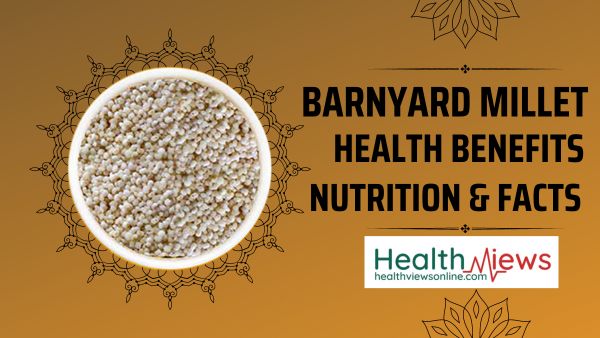Barnyard millet, also known as “Jhangora” in Hindi, is a popular millet variety that is widely consumed in India. It is an important source of nutrition for people who are gluten-intolerant or those who want to reduce their rice and wheat intake. This millet is easy to digest and provides several health benefits. It is also a great alternative to rice and can be used to prepare a variety of dishes.
Barnyard millet is a small-seeded millet that is native to India. It is an annual grass that grows up to a height of 70-100 cm. The plant is drought-resistant and can grow in poor soil conditions. The millet is usually harvested 70-90 days after sowing. Barnyard millet is a rich source of dietary fiber, protein, vitamins, and minerals. It also contains phytochemicals that have antioxidant properties. The millet has a low glycemic index, which makes it an ideal food for people with diabetes. It is also a good source of energy and can help improve digestion.
In various parts of India, Barnyard millet is known by different names. In Hindi, it is called “Jhangora” or “Samak”. In Tamil, it is called “Kuthiraivali”. In Kannada, it is known as “Oodalu” or “Navane”. In Telugu, it is called “Udalu”. In Malayalam, it is known as “Kavadapullu”. In Bengali, it is called “Shyama” or “Swank”. In Oriya, it is known as “Kangu” or “Suan” and “Vari cha tandul” in Marathi. These names may vary depending on the region, but the benefits of Barnyard millet remain the same.
Also, Read Kalmegh Health Benefits, Health Properties, Precautions & Side Effects
Millet Nutrition Profile: The Nutrients Present in Barnyard
Let’s have a look at the nutrition profile per 100g of Barnyard Millet as provided by Biodiversity for Food and Nutrition (Source):
- 1. Calorific value, kcal/100 g 398.0
- 2. Protein 10.5 %
- 3. Fat 3.6 %
- 4. Crude fiber 6.6 %
- 5. Total minerals 2.0 %
- 6. Total carbohydrates 68.8 %
- 7. Total dietary fiber 12.6 %
HIGH IN NUTRIENTS
Barnyard millet is a good source of essential nutrients, including vitamins, minerals, and antioxidants. It is rich in iron, which is important for the formation of red blood cells and the transport of oxygen throughout the body. It also contains calcium, which is essential for healthy bones and teeth, and phosphorus, which is important for the proper functioning of the nervous system. Barnyard millet is also a good source of B-complex vitamins, which play a vital role in the metabolism of carbohydrates, proteins, and fats. Additionally, it contains antioxidants, which help to protect the body from damage caused by free radicals.
AIDS IN DIGESTION
Barnyard millet is a rich source of fiber, which makes it an excellent food for promoting digestive health. Consuming a diet high in fiber can help regulate bowel movements, prevent constipation, and improve overall gut health. The insoluble fiber in barnyard millet also acts as a prebiotic, promoting the growth of healthy gut bacteria that aid in digestion and nutrient absorption. Additionally, the high amounts of magnesium in barnyard millet can help regulate digestion by relaxing the muscles of the digestive tract.
HELPS MANAGE BLOOD SUGAR LEVELS
Barnyard millet is a great food option for people with diabetes or those looking to manage their blood sugar levels. This is because it has a low glycemic index, meaning it is digested and absorbed more slowly, resulting in a slower and more controlled release of glucose into the bloodstream. The slow release of glucose helps to prevent blood sugar spikes and crashes, making it a more stable and sustained energy source. Additionally, the high fiber content in barnyard can help regulate blood sugar levels by slowing down the absorption of carbohydrates in the body.
HELPS IN WEIGHT LOSS
Barnyard is a low glycemic index (GI) food, which means it releases sugar into the bloodstream slowly, preventing sudden spikes and crashes in blood sugar levels. This quality makes it an ideal food for those trying to lose weight, as it keeps one feeling full for longer and helps control appetite. Additionally, barnyard millet is high in dietary fiber, which is important for maintaining healthy bowel movements, aiding digestion, and reducing constipation. It also helps to eliminate waste and toxins from the body, making it an excellent addition to any weight loss diet plan.

GOOD FOR BONE HEALTH
Barnyard is rich in essential minerals like calcium, phosphorus, and magnesium, all of which are important for building and maintaining strong bones. These minerals are crucial for bone development, growth, and repair, and they help prevent bone-related disorders like osteoporosis. Regular consumption of barnyard millet can improve bone density, making it an excellent food for growing children, postmenopausal women, and older adults. It also contains a range of vitamins, including vitamin B6, which helps prevent bone loss and fractures.
In conclusion, Barnyard millet is a nutritious and versatile grain with numerous health benefits. It is high in fiber, protein, and essential nutrients, making it an excellent addition to any diet. With its gluten-free properties and ability to aid in weight loss, digestion, and diabetes management, it is no surprise that Barnyard millet is becoming a popular alternative to traditional grains like rice and wheat.
Also, Read Health Benefits of Shatavari: Medicinal & Therapeutic Uses





